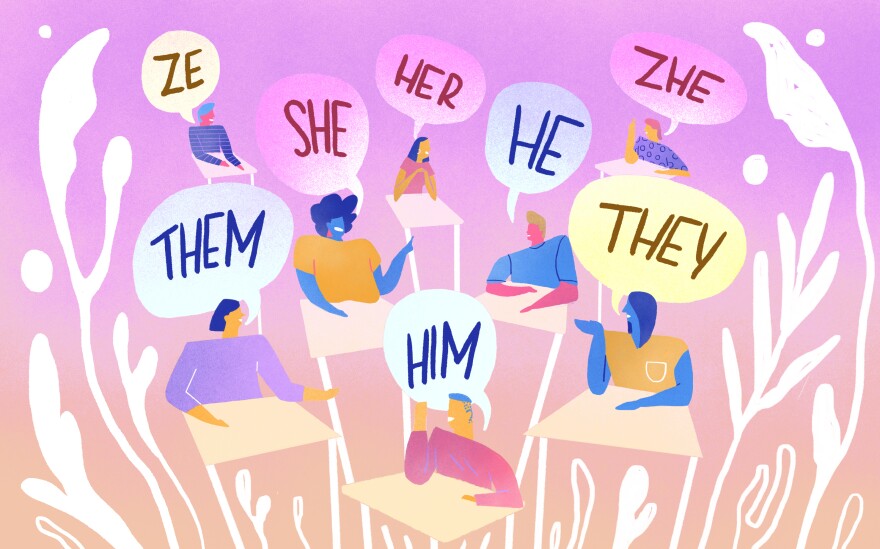Take a look at a class roster at the University of Vermont. You'll see the usual stuff there — last name, student ID and class year. But you'll also see something else. Next to some names, there are pronouns: "he" or "she," but also the gender nonspecific "they" or "ze."
They may seem like a few more words on paper, but for some students, like Jeane Robles, having pronouns on the roster means a lot.
"Just having the option to do that makes me feel like I can exist here," says Robles, a graduate student whose pronouns are they/them. If there was a fear that a professor might use the wrong pronouns, Robles says, "I [wouldn't] be able to fully be present."
A decade ago, the University of Vermont became the first school in the country to give students the ability to enter pronouns into campus data systems. Today, UVM is not alone — at least 20 colleges and universities give students that option, according to the Campus Pride Trans Policy Clearinghouse.
Even more schools, over 50, allow students to change the gender listed on their campus record without evidence of medical intervention, and more than 180 schools enable students to use a first name other than their legal name on campus records.
Advocates say one aim is to reduce the incidences where trans and gender nonconforming people are misgendered — referred to with pronouns that don't match their gender identity.
"It's very invalidating, and it makes me feel invisible," says Genny Beemyn, who directs the Stonewall Center at the University of Massachusetts, Amherst and coordinates the Trans Policy Clearinghouse. Beemyn, whose pronouns are they/them, says they get misgendered "all the time."
In many ways, the growth of these policies on some campuses is part of a larger trend that's also showing up in the workplace, and on the radar of lawmakers.
The Maryland General Assembly recently approved a bill that could make it the sixth state (along with Washington, D.C.) to include a gender-neutral option on driver's licenses. Many companies now include gender identity and expression in their nondiscrimination policies.
But it's on campuses in particular where pronouns, and conversations about pronouns, have taken off. And it's not just trans and gender nonconforming people sharing them; cisgender people (who identify with the gender they were assigned at birth) are, too. At some schools, pronouns are a part of the culture in every space. People put them in their email signatures and introduce themselves with their names and pronouns in meetings. They're shared commonly in classes and at campus events.
"There's certainly more of a movement around the visibility of pronouns [on campus]," says Z Nicolazzo, a professor of trans* studies in education at the University of Arizona. Nicolazzo, whose pronouns are she/her or ze/hir, is the author of Trans* in College: Transgender Students' Strategies for Navigating Campus Life and the Institutional Politics of Inclusion. (She uses an asterisk after "trans" to "make the term trans as [broad] as possible.")
But while the movement toward gender inclusivity has come to some schools, the transition has not always been smooth. In some cases, efforts to allow students to enter pronouns into campus records have sparked protests, especially over concerns that faculty and students would be required to use them.
In 2016, for example, a student at the University of Michigan selected "His Majesty" as his pronoun when the school implemented a new system. And last summer, the University of Minnesota became embroiled in a debate about pronoun use and free speech.
Beemyn, with the University of Massachusetts, Amherst, says instances of protest and backlash are generally uncommon: "I think young people recognize the importance of this issue and want to be respectful of people who identify as transgender or gender nonconforming."
Student data systems need to catch up
One challenge for institutions is that revising their student data systems can be slow and expensive. And any new policy must come with significant education for faculty and staff, Beemyn says.
For example, before the University of Massachusetts, Amherst adopted a system in 2018 enabling students to indicate their pronouns, Beemyn "spent more than a year going around to every faculty department" to prepare them for the change.
"Much more needs to be done"
Even at schools that work to incorporate pronouns into campus life, Nicolazzo, of the University of Arizona, says there is sometimes not a deep understanding of why pronouns are important in the first place.
"I really worry that it becomes almost like a checkbox kind of way of thinking about diversity and equity work," she says.
Many in higher education still approach gender as a binary thing — on campus, there tends to be a "false dichotomy between man and woman," Nicolazzo says. It's this binary, upheld through things like sex-segregated athletic teams, that can have especially negative consequences for trans and gender nonconforming students.
Policies involving pronouns are necessary steps forward, she adds, but "much more needs to be done."
Copyright 2021 NPR. To see more, visit https://www.npr.org.



